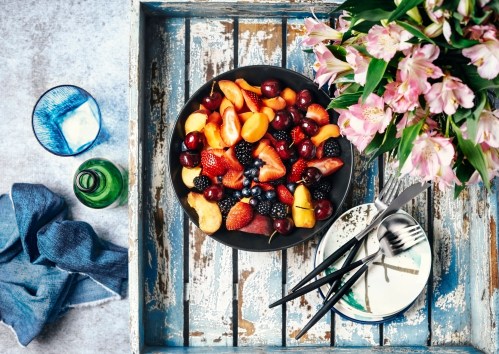Every night after dinner, I break apart one-third of a Trader Joe’s Absolute Black Dark Chocolate and eat it with frozen raspberries. The simple pairing is like fireworks to my tastebuds, and I honestly never get sick of the sweet-tart finalé to my day. And thus, when someone casually mentioned that eating fruit at night “was bad for digestion,” I was as miffed as I was confused. In attempt to prove this individual wrong, I consulted Tracy Lockwood Beckerman, RD, dietitian and host of Well+Good’s You Versus Food.
Experts in This Article
registered dietitian and author of The Better Period Food Solution.
Is eating fruit at night bad for digestion?
“It is completely false that ending a meal with fruit can disrupt digestion,” says Beckerman. (A-ha!) “Your body is designed to eat and break down all types of food—proteins, fats and carbohydrates—no matter the order in which you decide to eat it.”
Beckerman tells me that there is no research to support the idea that topping off lunch or dinner with fruit will throw a wrench in your body’s digestive processes. Instead, the myth likely stems from the fact that eating large portions of certain fruits can make your stomach feel slightly (erm) uncomfortable. “Having a lot of fruit post-meal could be a one way to ticket to the bathroom. Some fruits are tough to digest in large doses, like grapes or apples, so don’t say I didn’t warn you,” she says. This is due in part to fruit’s high fiber content, which is just another reason to eat more of it. The fiber will also help curb blood sugar spikes because it slows the absorption of fructose, aka the form of naturally-occurring sugar in fruit.
That being said, if you aren’t used to eating fiber in the evening, keep to smaller portions at first to avoid symptoms of indigestion. Additionally, she notes that those with diabetes and/or elevated blood sugar levels should consult a registered dietitian or a physician if they feel unsure about how much fruit is appropriate for them in the evening, since they have to be more mindful than others about any kind of sugar consumption.
If you have a sensitive stomach, just ease in slowly
As mentioned, your body will be totally on board with a smaller serving of apples, oranges, or—say—raspberries, once you’ve done the dishes and have a hankering for something sweet. “Just like anything, be mindful of how much fruit you throw back to avoid any potential indigestion, especially if you aren’t used to eating lots of fiber in the evening or have a sensitive stomach,” says the dietitian. “Keep it to just a serving—think a handful of berries, one clementine, or a small bowl of strawberries to round it out!”
The serving sizes of some of your favorite fruits
According to the U.S. Department of Agriculture (USDA), your daily recommendation of two cups can come in the form of fresh, frozen, dried, canned, pre-cut, or pureed fruit—it’s all good. But for those who do have a stomach that is sensitive to fiber, reference the single-serving list below from Beckerman.
- One cup apple is equal to 1/2 of a large apple
- One cup of banana is equal to one large banana
- One cup of grapes is the equivalent of 32 seedless grapes
- One cup of grapefruit equals one medium grapefruit
- One cup of orange is the equivalent of one large orange
- One cup of plums is the equivalent of three medium-sized plums
- One cup of strawberries is equal to eight large strawberries
Now, please excuse me while I go enjoy my fruity, chocolatey dessert in peace.
Ever heard of a lil’ fruit called the avocado? Here’s the nutritional verdict on everyone’s favorite fat:
So… can fruits and veggies ever really be bad for you? Plus, low-sugar fruits that won’t leave you with a sugar high.
Article originally published on October 1, 2019 with additional reporting by Betty Gold.
Oh hi! You look like someone who loves free workouts, discounts for cult-fave wellness brands, and exclusive Well+Good content. Sign up for Well+, our online community of wellness insiders, and unlock your rewards instantly.
Sign Up for Our Daily Newsletter
Get all the latest in wellness, trends, food, fitness, beauty, and more delivered right to your inbox.
Got it, you've been added to our email list.










